Entries tagged as train
Related tags
almaty alps asia asia2013 berlin border bus china coach erlian kazakhstan khorgas koktobe moscow mountains petropavl shymbulak snow transsiberian travel warsaw yining amusementpark aviation azerbaijan baikal beijing belarus capsulehotel caspian ccp censorship childrensday chinghai cinderella climatechange copyright dam disney disneyland dunhuang ecology erenhot fake ferry flying freesoftware greatfirewall guangzhou haikou hainan hohhot hongkong hostel hotel irkutsk journey kualalumpur language laos lenin listwjanka malaysia metro miradormansion mongolia poland portbaikal publictransport pyramid qwerty rain rainforest russia sanya seat61 shijingshan stepmania suprememaster terracottawarriors thailand tiananmen ticket tram transport transsib travelling trip2011 typhoon ulaanbaatar ulan-ude ulanude urumqi vegan vegetarian visa waterpower weather windenergy xian xinjiang yanoda yekaterinburg zamyn-uud zensur arcade architecture astana baiterek boluo boten casino coffee computerhistory copycat ghosttown hallstatt huizhou khanshatyry luoyang magistral migrationcard migrationpolice museum northwestchina retro retrogames tankodrom 129a 1mai 23c3 24c3 27c3 a100 abgeordnetenhaus akongress akw allianz anarchiekongress antiatom atheismus atomkraft autobahn bahnhof belene bild brandenburg bundestagunited buskampagne bz ccc cellular compiz creativecommons dataretention datenschutz demonstration dose elephantsdream energie energietisch energiewende freeculture freedomnotfear freifunk freiheitstattangst frequencies frequency fsfe gott gsm informationsfreiheit itu jugendumweltbewegung jukss kamera kameraüberwachung kernkraft klima klimaschutz klimawandel kohle kohlekraft kongress königswusterhausen kyoto lessig linux mcplanet mobilephones moleculeman musik ökologie ökostrom openbsc openbts openstreetmap osm osmocombb papst peterschaar piratenpartei polizeigewalt preise privacy privatsphäre ratzinger re-publica re-publica09 religion rp09 rwe science security sony springer strom stromnetz tagebaue taz theory thermen topberlin treptow tuberlin überwachung ubuntu umwelt umweltschutz unserwasser urgewald verkehr videoüberwachung volksbegehren vorratsdatenspeicherung wahl wasser wg wiki windowsxp wiretapping wirklimaretter wos wos4 youtube zimmer babelfish chinese english freizeitpark googletranslate journalismus mandarin presse pressefreiheit russian tagesschau translation universaltranslator cement climate decarbonization industry steel altparty antinuclear cablemodem d-link demoscene efficiency eletricity environment finland helsinki kabeldeutschland loviisa o2 router stromverbrauch crookedforest forest gryfino nature places blackhat defcon lasvegas retrogaming usaFriday, December 13. 2013
Fastest overland route from Europe to China
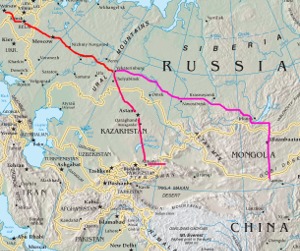 The well-known way of getting from Europe to China overland is the transsiberian railway. However, I noted that the route through Kazakhstan I took is the quickest way to get to China by train and bus. I thought I'd write that up:
The well-known way of getting from Europe to China overland is the transsiberian railway. However, I noted that the route through Kazakhstan I took is the quickest way to get to China by train and bus. I thought I'd write that up:- Take train EC 43 from Berlin Hauptbahnhof (09:37 on Monday, Berlin time) to Warsaw Wschodnia, change to train D 10SZ (15:28). If you - like me - feel that the time to switch trains is a bit risky in case of delaqys, you can take the earlier Beriln-Warsaw-train EC 41 (06:37 until 12:08). There's also a direct Berlin-Moscow-train D 50472 (Berlin 04:28, Moskwa Belorusskaja 10:33), but it's often sold out early.
- Spend some time in Moscow and then take the Metro Line 5 (Circular Line) to Komsol'skaya (Metro of Kazasky railway station)
- Take train 090У from Moscow Kazansky (18:48 on Tuesday, Moscow time) to Petropavl/Petropavlovsk in Kazakhstan (09:46 on Thursday, Astana/Almaty time). Note that this only works every second Tuesday - you may choose other days where this train goes, but then other options may not work.
- Take train 152T from Petropavl (13:48 on Thursday, Astana/Almaty time) to Almaty (22:28 on Friday, Astana/Almaty time).
- Take bus number 100 to Sayran bus station and hope that they'll sell you a ticket late in the evening for the bus next morning. Find a place to sleep (but not very long).
- Take bus from Astana Sayran bus station (07:00 on Friday, Astana/Almaty time) to Yining (approx. 21:00 on Friday, Beijing time). You're in China.
With the transsiberian, you can leave Berlin on Monday (same options as above until Moscow) and take the D4ZJ direct train from Moscow to Beijing. You will enter China in Erlian on the next Monday at 00:47. So this makes almost 7 days vs. about 4 and a half days.
I wouldn't recommend anyone doing that. Better spend some time on the way and see some places in Russia or Kazakhstan. Also it should be noted that one obvious reason for being faster is that you'll enter China at a place much further in the west. And getting to the main part of china (the western part is much less inhabited than the eastern part and all big cities are in the east) can be somewhat troublesome. Still, I thought it might be of interest to document the fastest overland way from Europe to China.
I always assumed the starting point Berlin, obviously because I live there, adapting that to other starting places should be trivial. For example you can usually easily (and for a comparatively cheap price) reach Berlin by Eurolines bus in a day from other major european cities like Paris or London.
Saturday, December 7. 2013
Xi'an, capsule hostel, chinese pyramids and more
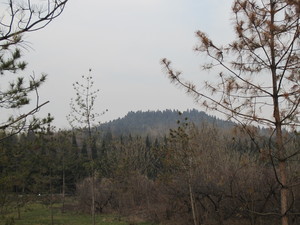
The great pyramid of China (I admin it doesn't look that spectacular and pyramid-like)
Between Dunhuang and Lanzhou, I took what is called the "hard seat" class for a 14 hour ride (not overnight). I can quote Wikivoyage on that:
"Traveling in a seat (hard or soft-class) means you will share the car space with lots of locals. You will most likely encounter smokers, loud noise, and constant activity in the aisle while you try to sleep. *Do not* travel hard class if you are uncomfortable with these settings."
While I certainly was an interesting experience, it is not exactly one I'd like to repeat. It was challenging and I was quite happy when I finally arrived.
With my arrival in Xi'an, finally I noticed that I approach the warmer zones of China. While not really "summer-warm", I apprechiated not having to wear winter clothes all the time. Appart from that, Xi'an was quite different from the other cities I've visited before. It is in many small ways much more like a western city (and, to be not mistaken, in many ways this is a good thing - better hygiene, less dangerous traffic, no smoking in non-smoking zones). And regarding my last blog post, yes, coffee is usually available, although often expensive.
Xi'an is also home of one of Chinas most popular tourist attractions, the so-called terracotta warriors and - not that well known - the Chinese pyramids. I didn't know that there are pyramids in China, so found that worth seeing. Unlike pyramids in other places of the world, the chinese pyramids are not buildings, they are artificial hills. The biggest one, near the terracotta warriors, is the mausoleum of Chinas first emperor Qin Shi Huang.
My initial plan was to visit the pyramid and then decide if I still had time and motivation to see the terracotta warriors. I took the bus to the terracotta warriors and walked the roughly two kilometers to the pyramid. Turned out my planning was not really how one was supposed to do things. Going to the pyramid is only possible with an entrance ticket for the terracotta warrior museum - and you cannot buy it at the entrance of the pyramid area. There's a free shuttle service which I then took to get the ticket and drive back.
The pyramid doesn't look that spectacular and there's hardly a spot where you can actually see it's a pyramid. It once was much bigger, but during the centuries, the earth got compressed and it became smaller. I walked around a lot, the area around is a nice park.
As it is common amongst tourist destinations probably everywhere in the world, there is a huge amount of people who want to sell you things - from terracotta warrior replica in all sizes (including ones in original size and made mostly out of the same materials than the original ones) to the various tour guides. I refused all these offers and preferred to find my own way. One more thing notable: This isn't mainly a tourist spot for foreign tourist. The vast majority were domestic tourists.
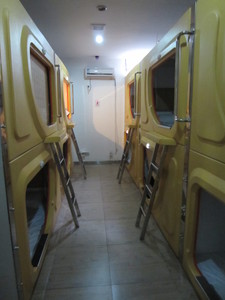
Capsule Hotel in Xi'an
While writing this, I'm in the highspeed train from Xi'an to Guangzhou (taking only 8 hours). I've been to Guangzhou before, and I'm not going there not mainly because I want to see something there. I have a double-entry 2 x 30 days visa and from Guangzhou, I intend to make a quick hop to Hong Kong. Although part of China, in visa issues Hong Kong is like going to another country. So by going to Hong Kong, I have another 30 days to spend in China. Arriving in Guangzhou, I can also finally leave any traces of the northern hemisphere winter behind myself. It has comfortable temperatures all year round.
Pictures from Xian
Pictures from Guangzhou
Posted by Hanno Böck
in English, Life
at
04:06
| Comments (0)
| Trackbacks (0)
Defined tags for this entry: asia, asia2013, capsulehotel, china, pyramid, terracottawarriors, train, xian
Saturday, November 30. 2013
Through Western China and no train tickets from Urumqi
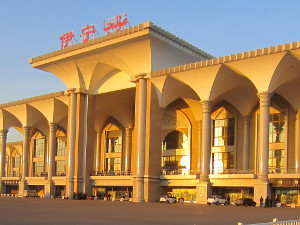
Train station in Yining
I took the train from Yining to Urumqi. My original plan was to move along quite fast and directly take the next train to Xi'an. But that didn't really work. I had to find out that all train tickets for the upcoming days to every location east of Urumqi were sold out. This was kind of a déjà vu. Last time I was in China I had the plan to travel this way in the other direction - and no tickets were available. Reading local news, this situation might improve 2014, when a new highspeed train line opens between Urumqi and Lanzhou. I didn't want to wait that long though.
However, this time I knew that there are alternatives - by taking the bus. I took a bus to the town Dunhuang, which is about 1,000 kilometers east of Urumqi.
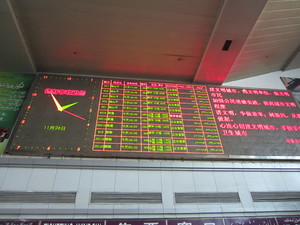
Bus times in Urumqi
The bus trip through the Xinjiang desert passed a lot of wind turbines. While China is often portrayed as the environmental bad guy, one shouldn't fail to recognize that it's also the world leader in building renewable energies. However, the many Xinjiang wind turbine fields also told the other not so green side of the Chinese renewable boom: Many of the turbines were just standing still. The most likely reason: China is building up wind power faster than it's caring for grid integration. I'm used to that look in Germany - wind power there is also often downregulated, because grid integration is not keeping up with the installation of new wind energy. But it was quite obvious that this problem is far bigger here in China's desert.
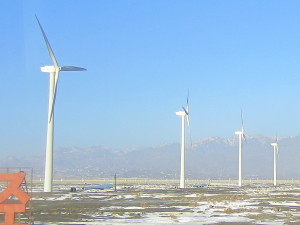
Wind energy in Xinjiang
Tomorrow I'll take the train to Lanzhou.
Pictures from Yining
Pictures from Dunhuang
Pictures from wind power turbines in the Xinjiang province
Pictures from Lanzhou
Tuesday, November 12. 2013
Travelling again
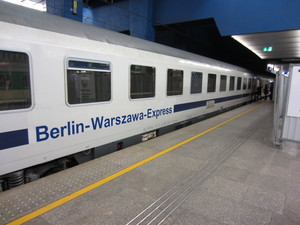 If you've been reading my blog back in 2011, you'll remember that I did a two-month-long trip on the transsiberian railway through Russia, Mongolia and China. Ever since the idea was in my head that I wanted to do something alike again.
If you've been reading my blog back in 2011, you'll remember that I did a two-month-long trip on the transsiberian railway through Russia, Mongolia and China. Ever since the idea was in my head that I wanted to do something alike again.So today I am starting a new journey to Asia, again mostly by train. Slightly modified from last time, as I don't need to see all the places again I've already been. I started today at 6 am in Berlin and I'm currently in Warsaw, Poland (where the 19th world climate conference is just starting, but that's purely a coincidence). I'll only spend a couple of hours in Warsaw and then will continue my trip to Moscow. From there, I'll head on to Kazakhstan and later to China. If everything works out as intended, I'll hopefully spend parts of the winter in warm and sunny areas.
I make no promises, but I'll try to keep my blog updated with pictures and events happening on my trip.
Technical note: All entries related to this trip will be marked with the tag asia2013. All entries related to my previous trip to asia can be found under the tag trip2011. Pictures will be collected here.
Tuesday, July 12. 2011
Travelling without flying - how I failed
I haven't stepped into an airplane for about 12 years. I travelled a lot through Europe with ferries, trains, busses and hitchhiking. It was my plan to stick to that on this big trip.
It's a simple fact that there is no viable option to use airplanes on a regular basis in a responsible way. There is no thinkable way that all humans on this planet can have access to planes. It only works because it's a privilege of a rich minority. And there's no thinkable way of combating climate change with the current growth rate of the aviation industry - not to mention the dangers of Peak Oil and unconventional oil extraction.
Some environmentalists who like flying found a very creative way to circumwent this: Compensating emissions. You pay an amount of money that's invested in some climate project for every flight you do. If I had to name the three most ridiculous actions people invented in combating climate change, compensating flight emissions would certainly rank amongst them (for the other two I'd vote carrot mobs and lights off actions). As above, this only works for a very small minority of rich people.
Ok, so back to our trip. It was my plan to avoid flying. I wanted to proove myself and others that it's possible. I failed. I took a plane from Beijing back to Germany. For a relatively trivial reason: Our plan was to take a train to Urumqi, then go to Kazakhstan and then we had two options, one with a train through russia to Ukraine and one through the caspian see to Azerbaijan (I will describe those in detail in a later blog entry). All of them requried getting to Urumqi first. There's no alternative route with public transport. And here's the problem: All tickets to Urumqi were sold out - for the whole time they can be booked in advance. So we wouldn't get tickets for an unknown amount of time.
I the end, after checking all alternative options I could think of, I decided to take a plane back to Germany and shorten my trip. I wasn't that unhappy about it after all, because I experienced our trip much more exhausting than imagined.
There would've been one other option: Taking the transsiberian train back. But that imposes another difficulty that has to do with russias visa regulation. A russian tourist visa is valid for 30 days. So ours is expired. It is not possible to get two visa at the same time, so it was not possible to arrange this in advance (it was our original plan to go back through Russia). And it is not possible to get a russian tourist visa anywhere else than in your home country. It used to be possible in Hong Kong in the past, but recently russia has tightened its visa regulations and according to several online sources this is no longer the case. The only option is getting a Russian transit visa. But that means you have to do the whole trip in a row and have all the tickets to Moscow and further to another country ready beforehand. This means several days in a train without much possibility to pause. I decided that I'm not up for that. I already found the many long train trips we did very difficult, partly because I'm slightly claustrophobic. My girlfriend will do the train trip - I won't. If you are ever in the same situation and need a travel agency, I can suggest Monkey Shrine - they are quite expensive, but their service was excellent. They were able to arrange all tickets including ones from Moscow to Kiev or Tallin and offered a lot of different options for all parts of the trip.
Now I don't think that my single flight will change much. It was a symbolic thing. But I think that opening options for flightless travelling is essential and gets far too less attention. If people talk about environmental or sustainable tourism, the issue of aviation is rarely spoken about. Often enough the problem is just that it is never considered. Take the visa regulation: If you enter and leave a country with an airplane, you usually don't need any visa - even if you change the plane within the country. There's no comparable rule for trains. You even need a visa if you enter and leave a country in a train without a stop. If you're looking for organized transsiberian railway trips, almost all the time it's taking the train for one direction and the plane for the other. Different public transport options often don't fit very well together. I always illustrate this with an experience I had last year when I switched from the train in Zeebrugge in Belgium to the ferry to Edinburgh - there was not any proper footpath from the train to the ferry, although they were only some dozent meters apart. You had to either illegally cross the railway lines or walk on a big street without a footway. I think many missing links for travel options could be closed if there would be more people doing it (e. g. there is no ferry from Singapoure or other Asian countries to Australia and none between Russia and Alaska, although the way isn't that far).
These are just some unfinished thoughts, but I could imagine there is a need for a lobby for flightless travelling. There's much more one could write about it. Flightless travelling means slower travelling - which brings up a discussion about our relation to working time.
If you're interested in flightless travelling, the best online ressource I found is the great webpage seat61.
My trip ends here, but some more blog entries will follow with stuff I didn't find the time yet to write down.
It's a simple fact that there is no viable option to use airplanes on a regular basis in a responsible way. There is no thinkable way that all humans on this planet can have access to planes. It only works because it's a privilege of a rich minority. And there's no thinkable way of combating climate change with the current growth rate of the aviation industry - not to mention the dangers of Peak Oil and unconventional oil extraction.
Some environmentalists who like flying found a very creative way to circumwent this: Compensating emissions. You pay an amount of money that's invested in some climate project for every flight you do. If I had to name the three most ridiculous actions people invented in combating climate change, compensating flight emissions would certainly rank amongst them (for the other two I'd vote carrot mobs and lights off actions). As above, this only works for a very small minority of rich people.
Ok, so back to our trip. It was my plan to avoid flying. I wanted to proove myself and others that it's possible. I failed. I took a plane from Beijing back to Germany. For a relatively trivial reason: Our plan was to take a train to Urumqi, then go to Kazakhstan and then we had two options, one with a train through russia to Ukraine and one through the caspian see to Azerbaijan (I will describe those in detail in a later blog entry). All of them requried getting to Urumqi first. There's no alternative route with public transport. And here's the problem: All tickets to Urumqi were sold out - for the whole time they can be booked in advance. So we wouldn't get tickets for an unknown amount of time.
I the end, after checking all alternative options I could think of, I decided to take a plane back to Germany and shorten my trip. I wasn't that unhappy about it after all, because I experienced our trip much more exhausting than imagined.
There would've been one other option: Taking the transsiberian train back. But that imposes another difficulty that has to do with russias visa regulation. A russian tourist visa is valid for 30 days. So ours is expired. It is not possible to get two visa at the same time, so it was not possible to arrange this in advance (it was our original plan to go back through Russia). And it is not possible to get a russian tourist visa anywhere else than in your home country. It used to be possible in Hong Kong in the past, but recently russia has tightened its visa regulations and according to several online sources this is no longer the case. The only option is getting a Russian transit visa. But that means you have to do the whole trip in a row and have all the tickets to Moscow and further to another country ready beforehand. This means several days in a train without much possibility to pause. I decided that I'm not up for that. I already found the many long train trips we did very difficult, partly because I'm slightly claustrophobic. My girlfriend will do the train trip - I won't. If you are ever in the same situation and need a travel agency, I can suggest Monkey Shrine - they are quite expensive, but their service was excellent. They were able to arrange all tickets including ones from Moscow to Kiev or Tallin and offered a lot of different options for all parts of the trip.
Now I don't think that my single flight will change much. It was a symbolic thing. But I think that opening options for flightless travelling is essential and gets far too less attention. If people talk about environmental or sustainable tourism, the issue of aviation is rarely spoken about. Often enough the problem is just that it is never considered. Take the visa regulation: If you enter and leave a country with an airplane, you usually don't need any visa - even if you change the plane within the country. There's no comparable rule for trains. You even need a visa if you enter and leave a country in a train without a stop. If you're looking for organized transsiberian railway trips, almost all the time it's taking the train for one direction and the plane for the other. Different public transport options often don't fit very well together. I always illustrate this with an experience I had last year when I switched from the train in Zeebrugge in Belgium to the ferry to Edinburgh - there was not any proper footpath from the train to the ferry, although they were only some dozent meters apart. You had to either illegally cross the railway lines or walk on a big street without a footway. I think many missing links for travel options could be closed if there would be more people doing it (e. g. there is no ferry from Singapoure or other Asian countries to Australia and none between Russia and Alaska, although the way isn't that far).
These are just some unfinished thoughts, but I could imagine there is a need for a lobby for flightless travelling. There's much more one could write about it. Flightless travelling means slower travelling - which brings up a discussion about our relation to working time.
If you're interested in flightless travelling, the best online ressource I found is the great webpage seat61.
My trip ends here, but some more blog entries will follow with stuff I didn't find the time yet to write down.
Monday, July 4. 2011
Hainan Island
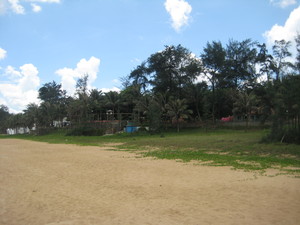 Hainan (海南) Island is the southmost point of China and has a tropical climate. It has some tourist-oriented cities with beaches and many coconut trees. We stayed some days in Haikou (海口) and Sanya (三亚).
Hainan (海南) Island is the southmost point of China and has a tropical climate. It has some tourist-oriented cities with beaches and many coconut trees. We stayed some days in Haikou (海口) and Sanya (三亚).Hainan also has some of China's rainforests. We made a trip to Yanoda rainforest park (呀诺达雨林). It was quite interesting, though somewhat unexpected: The trips to this rainforest are very organized - you never walk really in the forest, only on prepared wood-ways and the whole thing is more park-like and you're guided through it.
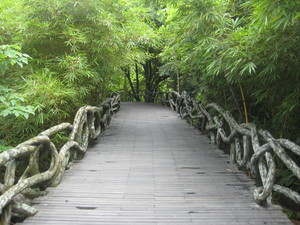 As I already wrote, we didn't manage to take the ferry and got to Haikou (and later to Sanya) by train - however, there is no bridge, so the train is put on a ship. Sadly, it wasn't possible to leave the train during that time. On our way back, it was somewhat difficult to get a ticket, as we left on the day after the typhoon - and all the people who planned to leave the day before either on the ferry or on a train also tried to get tickets so we had to queue for four hours.
As I already wrote, we didn't manage to take the ferry and got to Haikou (and later to Sanya) by train - however, there is no bridge, so the train is put on a ship. Sadly, it wasn't possible to leave the train during that time. On our way back, it was somewhat difficult to get a ticket, as we left on the day after the typhoon - and all the people who planned to leave the day before either on the ferry or on a train also tried to get tickets so we had to queue for four hours.Pictures from Hainan island
Pictures from Yanoda rainforest
Saturday, May 21. 2011
The Trans-Siberian Railway
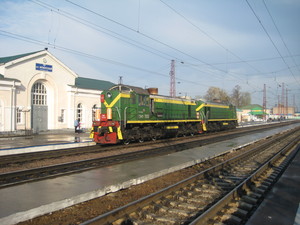 Large parts of our trip to Asia is on the famous Trans-Siberian Railway. It goes from St. Petersburg in the north-west of Russia to Vladivostok in the far south-east and has several sideways like the Trans-Mongolian line and the Trans-Mandshurian line to China. I started my Transsib-trip in Moscow and am currently in Ulan-Ude (Улан-Удэ).
Large parts of our trip to Asia is on the famous Trans-Siberian Railway. It goes from St. Petersburg in the north-west of Russia to Vladivostok in the far south-east and has several sideways like the Trans-Mongolian line and the Trans-Mandshurian line to China. I started my Transsib-trip in Moscow and am currently in Ulan-Ude (Улан-Удэ).Travelling in middle-Europe, one is usually not used to several-day long train tips. On our trip, we used only Platzkart (плацкарт), which is the 3rd and cheapest class which has a bed (on some parts you can get seat only tickets, which are even cheaper, but we always travelled over night, so this was no suitable option). Platzkart means that you're not travelling in small compartments, the whole carriage is one compartment with several beds in it. Although we read in several travelling guides that it's an uncommon option for European travellers, we found it quite satisfying.
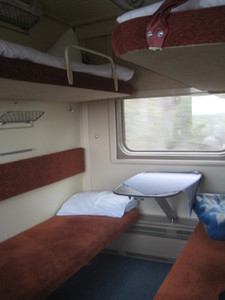 Every carriage has usually two train conductors. Something common on russian trains is that you can always get hot water to make tea or packet soup. I read in advance that there are a lot of food facilities on the stations, but this turned out to be much less of an option than thought. There are usually only small kiosks which all have more or less the same offerings.
Every carriage has usually two train conductors. Something common on russian trains is that you can always get hot water to make tea or packet soup. I read in advance that there are a lot of food facilities on the stations, but this turned out to be much less of an option than thought. There are usually only small kiosks which all have more or less the same offerings.Our longest train-trip was from Yekaterinburg to Irkutsk, which took us more than two days. It was very exhausting and we plan to avoid any more train trips longer than 24 hours for the rest of our journey. We also had some unpleasant experiences with drunken fellow passengers.
Pictures from Train Yekaterinburg - Irkutsk
Update: What I forgot to mention that's very noteworthy: On our trip, the transsiberian train was always very sharp on its schedule, at maximum it was only minutes behind. Very remarkable for several day long train trips.
Monday, May 16. 2011
Yekaterinburg
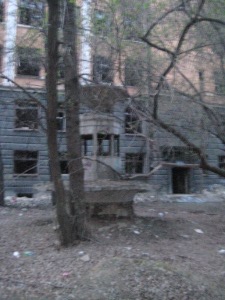 I am a bit behind with blogging my trip - not enough time, and if there's enough time, theres often not enough electricity or internet.
I am a bit behind with blogging my trip - not enough time, and if there's enough time, theres often not enough electricity or internet.We stayed for two days in Yekaterinburg (Екатеринбу́рг), which is the first big asian city if you travel from Europe to Russia. Yekaterinburg is probably a place where international visitors rarely drop by.
We stayed at two couchsurfers who operate a vegetarian shop in an area where vegetarism is barely known at all. So if you are ever in Yekaterinburg and need some tofu or soy milk, be sure to visit their shop.
The most relevant and unpleasant event during our stay was our attempt to get a ticket for our further route. I first thought that this wouldn't be a big issue, as we can order online tickets. But, as I already mentioned before, this is not an option here. For reasons unknown to me, this only works if you board the train at its starting point. So we went to the train station to try to get a ticket. Without much knowledge of Russian language, this was a really tough task and took us several hours. We wrote down the train we wanted to take and some Russian sentences we took from a travel guide. We were sent from one counter to the other, several times the ticket counter closed or made a "15 minute" pause (which in fact were more like 45 minutes) just in front of us. All in all I don't really know when we started this, so I don't know how long it took, but after all, we had the tickets we wanted in our hands - and they were significantly cheaper than any online offer we saw.
 Beside the ticket buying, which took us half a day and limited the time we had to see the city, some interesting places worth mentioning:
Beside the ticket buying, which took us half a day and limited the time we had to see the city, some interesting places worth mentioning:- Yekaterinburg has a very geekish sight: A keyboard monument (some websites like Wikitravel call it the QWERTY monument, but I don't know if that's its official name) - a big keyboard made of stones (map link).
- We were shown an old hospital that was closed about 10 years ago and is now a place where adventurous people do urban exploration and locals tell horror stories about hidden subfloors. Most of the building is in very bad shape and some fountains around it give it a very special atmosphere. A small part of the building however is still operational (I don't know the exact place, but it must be around here).
A common thing to see in Yekaterinburg are trolley busses - busses that uses overhead wires.
What I experienced the first time here was a kind of real-world spam that seems to be common in Russia: In the pedestrian area, many shops used sound systems for advertisement. So you hear a lot of music and loudspeakers telling you the latest cheap offers all the time. Very disturbing.
We've continued our trip to Irkutsk, but I'll write about that later.
Pictures from Yekaterinburg
(Page 1 of 1, totaling 8 entries)